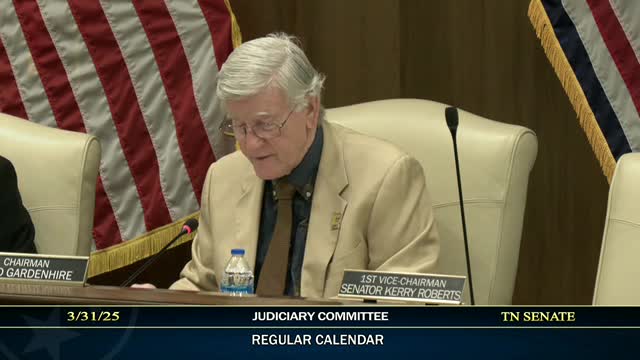Senate panel sends bill to fund statewide SART coordinator to finance after testimony
Get AI-powered insights, summaries, and transcripts
Subscribe
Summary
The Senate Judiciary Committee voted 5-2 to send Senate Bill 11-23 to the Finance Committee. The bill would create a statewide coordinator for sexual-assault response teams, housed with a nonprofit and funded through existing grants; advocates and medical staff testified in support while the district attorneys' conference noted recent amendments.
The Senate Judiciary Committee voted 5-2 to send Senate Bill 11-23 to the Finance Committee after testimony from advocates and medical staff that the measure would standardize support for sexual-assault response teams (SARTs) across the state.
The bill, as explained by sponsor Senator Harshbarger, would create a statewide coordinator to provide leadership, technical assistance and oversight to local SARTs and would be housed with the Tennessee Coalition to End Domestic and Sexual Violence and funded by existing grants from the Department of Finance and Administration’s Office of Criminal Justice Programs. “This role will support teams across the state with training, ensure compliance with best practices, and submit an annual report to the legislature,” Harshbarger said.
Nut graf: Supporters told the committee they see uneven SART capacity across counties and say a single coordinator would improve victim care and consistency while using existing funding rather than creating a new agency. Opponents cautioned that an amended House version removes some oversight authority from the coordinator and returns it to local groups.
Lorraine McGuire, identified herself as vice president of community relations at the assault center and board chair of the Tennessee Coalition to End Domestic and Sexual Violence. McGuire told the committee that a central coordinator could help replicate successful local programs statewide. “A lot of the times we’ll use this in Davidson County through the SAFE clinic…we were able to do certain trainings for law enforcement and bring that together,” McGuire said.
Katrina Brown, a sexual-assault nurse-examiner team lead at Vanderbilt University Medical Center, described how multidisciplinary SART work improved reporting and victim care in Davidson County and how local differences make statewide technical assistance useful. “By active participation on the SART team, I am able to interact with advocates, with law enforcement and other first responders…and shape our practice,” Brown said.
Steven Crump, executive director of the Tennessee District Attorneys General Conference, told the committee there is a house amendment that removes the oversight element from the coordinator and preserves oversight at the local level. “The bill that you see is not the bill that you will ultimately see on the senate floor,” Crump said, referencing the amendment.
The committee recorded the motion by Senator Harshbarger with a second from Senator Rose; the roll call recorded Harshbarger, Kyle, Lamar, Rose and Taylor as voting aye and Stevens and Chairman Gordon Hire voting no. Senator Harshbarger’s bill was reported to Finance.
Ending: The bill will next be considered by the Finance Committee; supporters asked members to look to existing grant funding to staff the coordinator if the measure advances.
